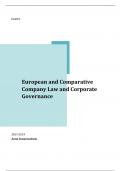Samenvatting
Summary European and Comparative company law (15/20)
- Vak
- Instelling
Those are complete notes for the European and Comparative company law course that I did, based on the oral explanation and the power points. It is perfectly complete and contains all relevant information note: there might be some spelling faults
[Meer zien]












